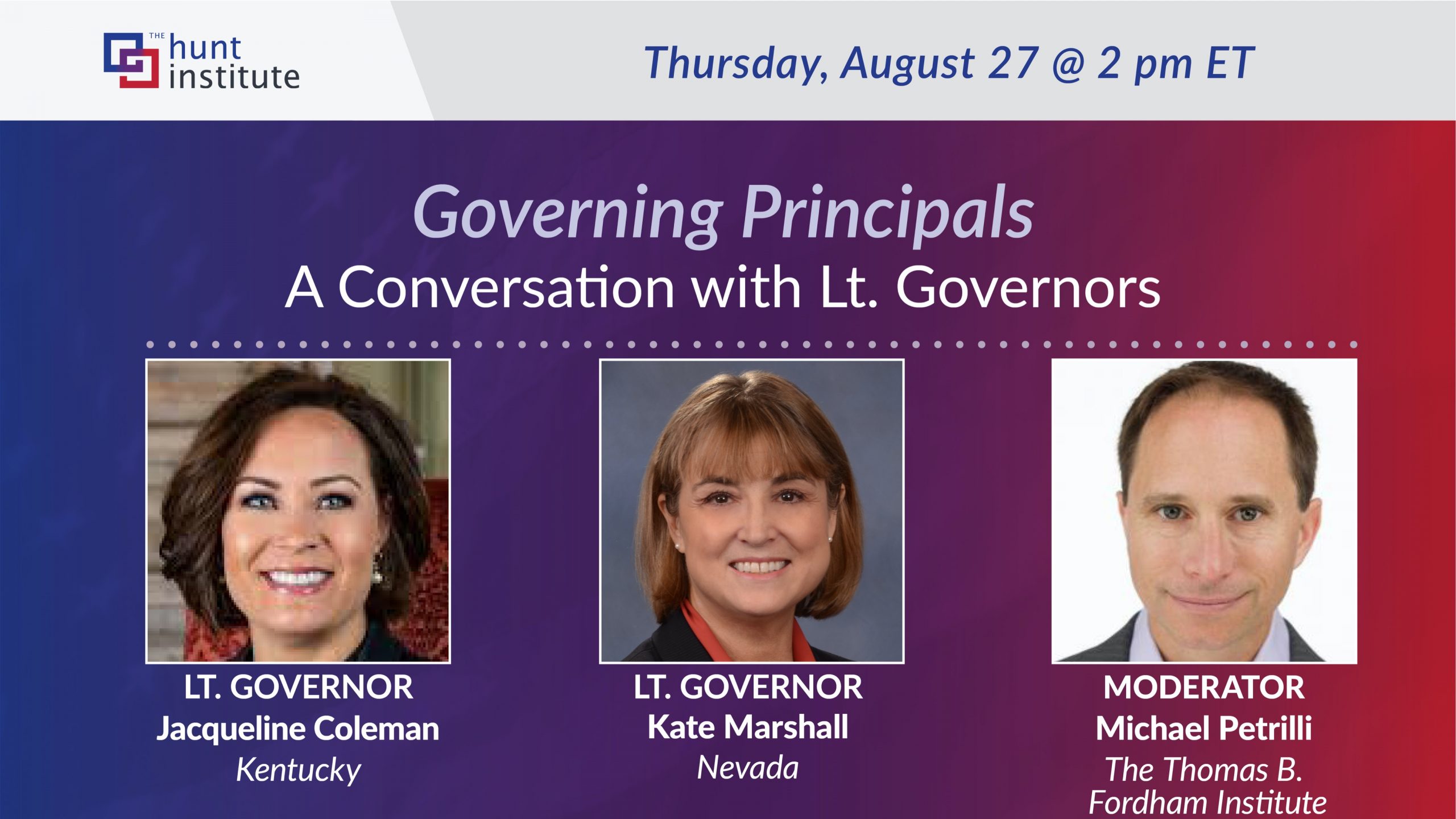

September 3, 2020

With the 2020-21 school year underway and school districts across the nation approaching learning in the time of COVID-19 differently, state leaders are persistent in engaging in the tireless work to support the diverse needs of the communities they serve. In our latest installment of Governing Principals, we were joined by Kentucky Lt. Governor Jacqueline Coleman, Nevada Lt. Governor Kate Marshall and special guest moderator Michael Petrilli of the Fordham Institute to hear more about how states are contending with issues around school finance and facilitating high-quality instruction in the face of the ongoing COVID-19 pandemic.
“In every crisis there is an opportunity…Use those CARES Act dollars with a forward-thinking view about the costs of education.”
-Nevada Lt. Gov. Kate Marshall
The significant economic impact of COVID-19 has placed a tremendous burden on families across the nation, which has led to major budget shortfalls at the state level. Despite help from the CARES Act, policymakers have had to, and will continue to, make difficult decisions as it relates to state budgets, many of which will impact education across the continuum. As a former State Treasurer, Lt. Governor Marshall provided valuable context as states are approaching this issue. Lt. Governor Marshall spoke to the important role the federal government plays in supporting states with meeting current student needs. While CARES Act funding can be used to build broadband capacity, meaningful change to overcome the digital divide would require the federal government to begin treating broadband as a utility in order to adequately fund construction of the infrastructure necessary to provide high speed internet access to all families. Further, federal support with food insecurity programs like Free Meal Site and the Coronavirus Food Assistance Program must be extended to ensure that students can focus on learning instead of where their meals are coming from.
For schools across the nation who are funded based on “average daily attendance,” it is a real possibility that the difficulty in getting accurate student counts due to remote learning or the loss of enrollment due to parents seeking alternative learning environments because of COVID-19 will lead to significant budget shortfalls. Lt. Governor Coleman shared that in Kentucky Governor Andy Beshear signed an executive order removing “daily average attendance” as a measure for funding. This policy will preserve flexibility for school leaders and prevent schools from having to cut teaching positions as a result of the pandemic.
“We need to help our kids move out of this time of anxiety and isolation so that they can catch up academically to have the best future possible.”
-Kentucky Lt. Gov. Jacqueline Coleman
A former educator herself, Lt. Governor Coleman has been able to combine policy knowledge with a grounded perspective on how state decisions impact the daily lives of teachers and students in Kentucky. Through her work leading the Education Continuation Task Force, Lt. Governor Coleman has been able to engage diverse stakeholders from across the state to support districts in pivoting to digital learning and opening safely for the 2020-21 school year.
When a question came up about learning “pods” that have emerged in response to distance learning, Lt. Governor Coleman shared that the Kentucky Department of Education has provided guidance around how teachers, or learning pods, can safely conduct small group work, similar to the safety guidance provided to early childhood centers. However, Lt. Governor Coleman expressed concern about how equitably such groups serve students, as more affluent families are more likely to have the resources to effectively establish a pod. To address the equity issue, some communities in Kentucky are coming together to find creative solutions. Fifty predominantly Black churches in Jefferson County, KY have signed on to a proposal that opens their doors to create support systems for students, with a focus on students with special needs and those who have struggled to access digital content.
Lt. Governor Marshall added that Boys and Girls Clubs in Nevada have worked to fill this equity gap for students and families looking for learning pods, but stressed that testing and contact tracing would be required to make the pod concept effective and sustainable.
To hear more about how these two leaders are addressing issues in education through this crisis, checkout the full recording below.